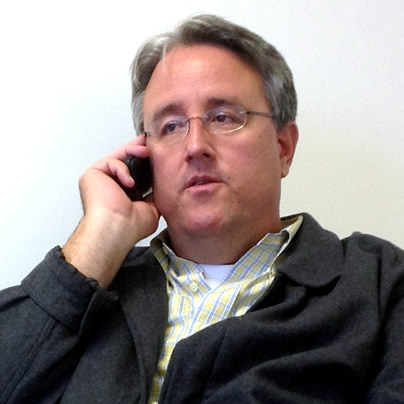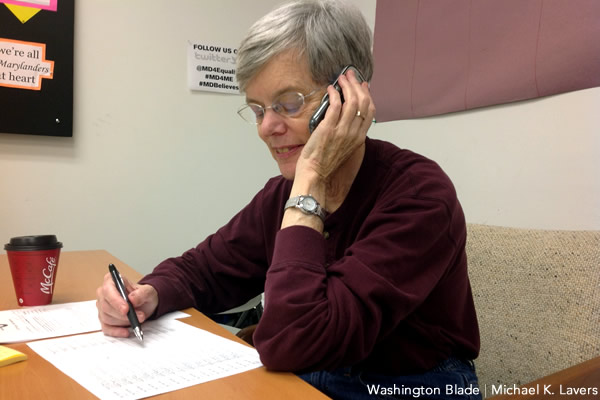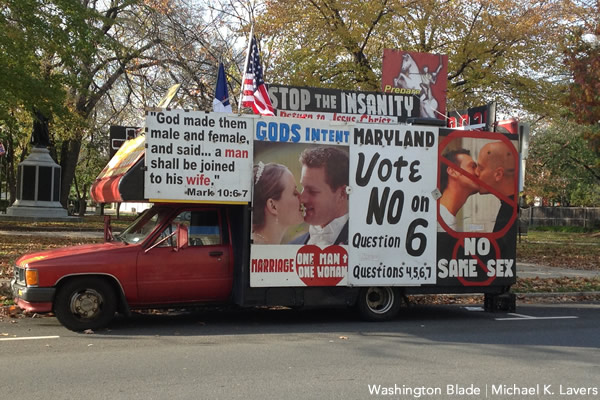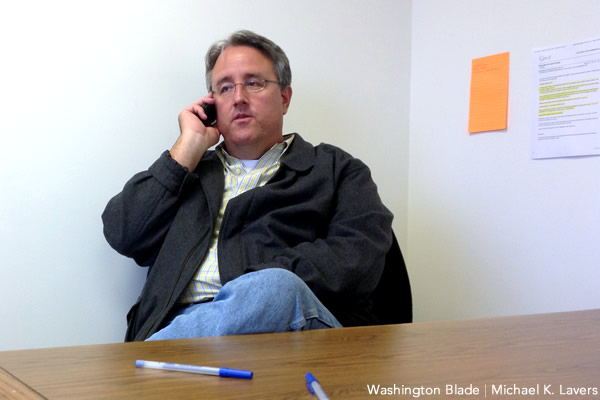Local
Supporters of Md. marriage law remain hopeful going into Election Day
Question 6 backers concede opposition has ‘been tough’


Silver Spring resident Deb Ferranz calls voters for Question 6 at Marylanders for Marriage Equality’s office in Silver Spring on Saturday (Washington Blade photo by Michael K. Lavers)
Supporters of Maryland’s same-sex marriage law said over the weekend they remain optimistic voters on Election Day will support Question 6.
“I want Maryland to make history,” said Silver Spring resident Laurette Cucuzzo as she called voters from Marylanders for Maryland Equality’s office in Silver Spring on Saturday afternoon. “I’m very excited about this. My sister’s gay and I want to support everyone’s right to equality. I think it’s really important.”
Silver Spring resident Deb Ferrenz also spoke to the Washington Blade as she called voters. She has been a Marylanders for Marriage Equality volunteer for several months, but she said the issue is important to her because her lesbian daughter married in Massachusetts.
“We’re saying kind of are you aware that there is getting a change to vote for a law that lets gay and lesbian couples get legally married in our state,” Ferrenz said. “And that we think it’s a matter of fairness and we hope they agree and they are planning to vote for Question 6.”
Maegan Marcano of Northeast Washington traveled to Silver Spring to “support Maryland.” She noted to the Blade as she sat with Cucuzzo and Mai-Kim Norman of D.C. same-sex couples began to legally marry in the nation’s capital in 2010 after D.C. Council passed a bill allowing nuptials for gays and lesbians.
“We were able to do that in the District of Columbia,” said Marcano, noting the passage of the city’s same-sex marriage bill did not happen without debate and even controversy. “It’s a little heart-wrenching that people who are not involved in our lives in the gay and lesbian community have to vote on this issue so that’s why I’m here to really kind of try to get that extra push.”
A Goucher College poll released Oct. 29 found 55 percent of Marylanders support marriage rights for same-sex couples in the state, compared to 39 percent who oppose them. A Washington Post survey published Oct. 18 noted 52 percent of Maryland voters support Question 6, compared to 42 percent who said they oppose it.
A third poll the Baltimore Sun conducted between Oct. 20-23 noted only 46 percent of respondents would vote for the law Gov. Martin O’Malley signed in March.
The governor, National Association for the Advancement of Colored People Chair Emeritus Julian Bond and other Question 6 supporters maintain the same-sex marriage law protects religious freedom in spite of opponents who continue to claim it does not.
“It is not a protection for churches,” said state Del. Kathy Afzali (R-Frederick County) during an anti-Question 6 rally at Baker Park in Frederick on Nov. 4. She cited Vermont innkeepers who claim a lesbian couple from New York sued them after they refused to host their wedding reception. Afzali also highlighted the suburban Boston man who maintains police arrested him in 2005 because he demanded his son’s teachers not expose him to discussions about homosexuality. “I’m not making this up. You can Google the stories. It’s true. So when they tell you that you’re protected, you are not protected.”

A van with anti-gay marriage signs and banners parked near an anti-Question 6 event at a Frederick park on Nov. 4. (Washington Blade photo by Michael K. Lavers)
State Del. Neil Parrott (R-Washington County) was among those who also spoke during the Frederick gathering that drew a few dozen people. Pastor Luke Robinson of Quinn Chapel AME Church in Frederick noted Superstorm Sandy struck New York City after Mayor Michael Bloomberg donated $250,000 to Marylanders for Marriage Equality.
“We believe marriage is and should remain defined as a union of one man and one woman,” said Peter Sprigg of Family Research Council, during the same event. “The second message is, if I can paraphrase Abraham Lincoln, that government of the people, by the people and for the people shall not parish in the state of Maryland.”
Sprigg noted the Maryland Court of Appeals in 2007 upheld the state’s ban on same-sex marriages based on what the majority concluded was the state’s “legitimate interests in fostering procreation” and “encouraging the traditional family structure in which children are born are reasonably related to defining marriage as the union of one man and one woman.” He also said LGBT advocates failed to spur Annapolis lawmakers to pass a same-sex marriage bill until earlier this year.
“Finally in 2012 they succeeded in pushing through this redefinition of our most fundamental social institution but we the people did not surrender,” Sprigg said. “As you heard we got at least three times the signatures needed to put this issue on the ballot. So the House of Delegates has had their say. The Senate has had their say. The governor has had their say, but on Tuesday we the people have our say.”
He further urged Maryland voters to use what he described as “simple common sense” when they go into the voting booth.
“On this issue I feel like people sometimes ignore the obvious: it takes one man and one woman to make a baby,” Sprigg said. “Marriage exists to encourage the man and woman to raise the child produced by their union. It is no disrespect to your friends or neighbors or relatives who may self-identify as gay or lesbian to say that; any more than it’s disrespectful to hard-working single parents or those living with relatives they’re not permitted to marry or those who choose not to marry at all. But the definition of marriage is not about finding the least common denominator. It’s about upholding the highest ideal. Society needs children. Children do best when they have a mom and a dad.”
Pastor Matt Braddock of Christ Congregational Church in Silver Spring disagreed with those who continue to claim Question 6 does not ensure religious freedom. More than 30 people took part in a 24-hour vigil in support of the same-sex marriage law on Nov. 2-3.
“People in this congregation who’ve been doing door-to-door canvassing I think are getting very positive messages from the households they are visiting, but the opposition has been tough,” Braddock told the Blade inside the sanctuary when asked how he feels going into Election Day. “They’ve been miscommunicating the facts and scaring people intentionally. I’ve been praying for 24 hours that people don’t believe lies and really respond generously.”
Like Braddock, gay state Sen. Rich Madaleno said he remains “guardedly optimistic” about Question 6 ahead of Tuesday.
“I feel really good about our chances,” he told the Blade at Marylanders for Marriage Equality’s Silver Spring office on Saturday afternoon. “I feel like we’ve really done almost everything we can do to put ourselves in the position to win. I’m heartened by the fact that poll after poll continues to show us ahead by substantial leads.”
District of Columbia
Bowser budget proposal calls for $5.25 million for 2025 World Pride
AIDS office among agencies facing cuts due to revenue shortfall

D.C. Mayor Muriel Bowser’s proposed fiscal year 2025 budget includes a request for $5.25 million in funding to support the June 2025 World Pride celebration, which D.C. will host, and which is expected to bring three million or more visitors to the city.
The mayor’s proposed budget, which she presented to the D.C. Council for approval earlier this month, also calls for a 7.6 percent increase in funding for the Mayor’s Office of LGBTQ Affairs, which amounts to an increase of $132,000 and would bring the office’s total funding to $1.7 million. The office, among other things, provides grants to local organizations that provide services to the LGBTQ community.
Among the other LGBTQ-related funding requests in the mayor’s proposed budget is a call to continue the annual funding of $600,000 to provide workforce development services for transgender and gender non-conforming city residents “experiencing homelessness and housing instability.” The budget proposal also calls for a separate allocation of $600,000 in new funding to support a new Advanced Technical Center at the Whitman-Walker Health’s Max Robinson Center in Ward 8.
Among the city agencies facing funding cuts under the mayor’s proposed budget is the HIV/AIDS, Hepatitis, Sexually Transmitted Disease, and Tuberculosis Administration, known as HAHSTA, which is an arm of the D.C. Department of Health. LGBTQ and AIDS activists have said HAHSTA plays an important role in the city’s HIV prevention and support services. Observers familiar with the agency have said it recently lost federal funding, which the city would have to decide whether to replace.
“We weren’t able to cover the loss of federal funds for HAHSTA with local funds,” Japer Bowles, director of the Mayor’s Office of LGBTQ Affairs, told the Washington Blade. “But we are working with partners to identify resources to fill those funding gaps,” Bowles said.
The total proposed budget of $21 billion that Bowser submitted to the D.C. Council includes about $500 million in proposed cuts in various city programs that the mayor said was needed to offset a projected $700 million loss in revenue due, among other things, to an end in pandemic era federal funding and commercial office vacancies also brought about by the post pandemic commercial property and office changes.
Bowser’s budget proposal also includes some tax increases limited to sales and business-related taxes, including an additional fee on hotel bookings to offset the expected revenue losses. The mayor said she chose not to propose an increase in income tax or property taxes.
Earlier this year, the D.C. LGBTQ+ Budget Coalition, which consists of several local LGBTQ advocacy organizations, submitted its own fiscal year 2025 budget proposal to both Bowser and the D.C. Council. In a 14-page letter the coalition outlined in detail a wide range of funding proposals, including housing support for LGBTQ youth and LGBTQ seniors; support for LGBTQ youth homeless services; workforce and employment services for transgender and gender non-conforming residents; and harm reduction centers to address the rise in drug overdose deaths.
Another one of the coalition’s proposals is $1.5 million in city funding for the completion of the D.C. Center for the LGBTQ Community’s new building, a former warehouse building in the city’s Shaw neighborhood that is undergoing a build out and renovation to accommodate the LGBTQ Center’s plans to move in later this year. The coalition’s budget proposal also calls for an additional $300,000 in “recurring” city funding for the LGBTQ Center in subsequent years “to support ongoing operational costs and programmatic initiatives.”
Bowles noted that Bowser authorized and approved a $1 million grant for the LGBTQ Center’s new building last year but was unable to provide additional funding requested by the budget coalition for the LGBTQ Center for fiscal year 2025.
“We’re still in this with them,” Bowles said. “We’re still looking and working with them to identify funding.”
The total amount of funding that the LGBTQ+ Budget Coalition listed in its letter to the mayor and Council associated with its requests for specific LGBTQ programs comes to $43.1 million.
Heidi Ellis, who serves as coordinator of the coalition, said the coalition succeeded in getting some of its proposals included in the mayor’s budget but couldn’t immediately provide specific amounts.
“There are a couple of areas I would argue we had wins,” Ellis told the Blade. “We were able to maintain funding across different housing services, specifically around youth services that affect folks like SMYAL and Wanda Alston.” She was referring to the LGBTQ youth services group SMYAL and the LGBTQ organization Wanda Alston Foundation, which provides housing for homeless LGBTQ youth.
“We were also able to secure funding for the transgender, gender non-conforming workforce program,” she said. “We also had funding for migrant services that we’ve been advocating for and some wins on language access,” said Ellis, referring to programs assisting LGBTQ people and others who are immigrants and aren’t fluent in speaking English.
Ellis said that although the coalition’s letter sent to the mayor and Council had funding proposals that totaled $43.1 million, she said the coalition used those numbers as examples for programs and policies that it believes would be highly beneficial to those in the LGBTQ community in need.
“I would say to distill it down to just we ask for $43 million or whatever, that’s not an accurate picture of what we’re asking for,” she said. “We’re asking for major investments around a few areas – housing, healthcare, language access. And for capital investments to make sure the D.C. Center can open,” she said. “It’s not like a narrative about the dollar amounts. It’s more like where we’re trying to go.”
The Blade couldn’t’ immediately determine how much of the coalition’s funding proposals are included in the Bowser budget. The mayor’s press secretary, Daniel Gleick, told the Blade in an email that those funding levels may not have been determined by city agencies.
“As for specific funding levels for programs that may impact the LGBTQ community, such as individual health programs through the Department of Health, it is too soon in the budget process to determine potential adjustments on individual programs run though city agencies,” Gleick said.
But Bowles said several of the programs funded in the mayor’s budget proposal that are not LGBTQ specific will be supportive of LGBTQ programs. Among them, he said, is the budget’s proposal for an increase of $350,000 in funding for senior villages operated by local nonprofit organizations that help support seniors. Asked if that type of program could help LGBTQ seniors, Bowles said, “Absolutely – that’s definitely a vehicle for LGBTQ senior services.”
He said among the programs the increased funding for the mayor’s LGBTQ Affairs office will support is its ongoing cultural competency training for D.C. government employees. He said he and other office staff members conduct the trainings about LGBTQ-related issues at city departments and agencies.
Bowser herself suggested during an April 19 press conference that local businesses, including LGBTQ businesses and organizations, could benefit from a newly launched city “Pop-Up Permit Program” that greatly shortens the time it takes to open a business in vacant storefront buildings in the downtown area.
Bowser and Nina Albert, D.C. Deputy Mayor for Planning and Economic Development, suggested the new expedited city program for approving permits to open shops and small businesses in vacant storefront spaces could come into play next year when D.C. hosts World Pride, one of the word’s largest LGBTQ events.
“While we know that all special events are important, there is an especially big one coming to Washington, D.C. next year,” Bowser said at the press conference. “And to that point, we proposed a $5.25 million investment to support World Pride 2025,” she said, adding, “It’s going to be pretty great. And so, we’re already thinking about how we can include D.C. entrepreneurs, how we’re going to include artists, how we’re going to celebrate across all eight wards of our city as well,” she said.
Among those attending the press conference were officials of D.C.’s Capital Pride Alliance, which will play a lead role in organizing World Pride 2025 events.
Maryland
Health care for Marylanders with HIV is facing huge cuts this summer
Providers poised to lose three-quarters of funding

BY MEREDITH COHN | By the end of June, health care providers in Maryland will lose nearly three-quarters of the funding they use to find and treat thousands of people with HIV.
Advocates and providers say they had been warned there would be less money by the Maryland Department of Health, but were stunned at the size of the drop — from about $17.9 million this fiscal year to $5.3 million the next. The deep cuts are less than three months away.
The rest of this article can be read on the Baltimore Banner’s website.
District of Columbia
Taste of Point returns at critical time for queer students
BIPOC scholar to speak at Room & Board event on May 2

The Point Foundation will kick off May with its annual Taste of Point DC event. The event will be hosted at Room & Board on 14th Street and feature a silent auction, food tastings, a speech from a scholar, and more.
Point’s chief of staff, Kevin Wright, said that at Taste of Point, the scholars are the star of the show.
“People never come to an event to hear Point staff speak, they come to hear from the people most impacted by the program,” he said. “At its core Taste of Point is designed to center and highlight our scholars’ voices and experiences.”
This year, a Point BIPOC Scholar, Katherine Guerrero Rivera will speak at the event.
“It is a great opportunity to highlight the scholars out there on the front lines making impacts in almost every sector and job field,” Wright said.
Wright pointed out that this year especially is a pivotal time for LGBTQ students.
“In 2023, there were 20 states that passed anti-LGBTQ legislation,” he said. “By this point in [2024] we already have more.”
Wright said the impacts of those legislative attacks are far reaching and that Point is continuously monitoring the impact they have on students on the ground.
Last month, The Washington Post reported that states with anti-LGBTQ laws in place saw school hate crimes quadruple. This report came a month after a non-binary student, Nex Bennedict, died after being attacked at school.
“So, we see this as a critical moment to really step up and help students who are facing these challenges on their campus,” Wright said. “Our mission is to continue to empower our scholars to achieve their full academic and leadership potential.”
This year Point awarded nearly 600 LGBTQ students with scholarships. These include the flagship scholarship, community college scholarship and the BIPOC scholarship. When the foundation started in 2002, there were only eight scholarships awarded.
Dr. Harjant Gill is one of those scholars who said the scholarship was pivotal for him. Gill said he spent his undergraduate years creating films and doing activism for the LGBTQ community.
As a result, his academic record wasn’t stellar and although he was admitted into American University’s graduate program he had no clue how he would fund it.
Upon arrival to American he was told to apply for a Point scholarship and the rest was history.
“It ended up being the one thing that kept me going otherwise I would have dropped out,” he said. “Point was incredibly instrumental in my journey to becoming an academic and a professor.”
More than a decade later, Gill serves on the host committee for Taste of Point and is a mentor to young Point scholars. He said that he donates money yearly to Point and that when he is asked what he wants for a gift he will often tell his friends to donate too.
To attend the event on Wednesday, May 2, purchase tickets at the Point website. If you can’t attend this year’s Taste of Point DC event but would like to get involved, you can also donate online.


















